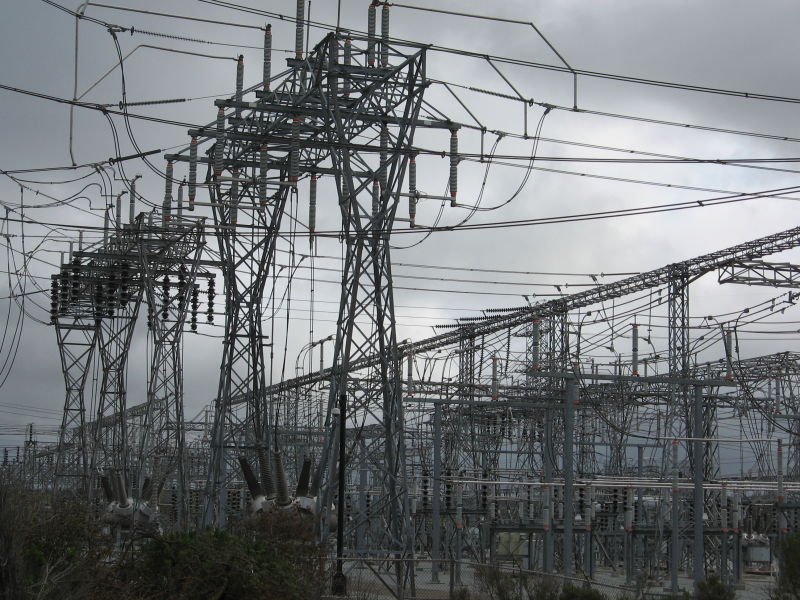The partisan rancor that has led to calls to take away federal funding from Planned Parenthood, a possible partial government shutdown and last Friday's announcement that House Speaker John Boehner is stepping down have created a climate where policy debates get pushed to the side.
"It's been sent to the Energy and Commerce Committee, where precisely nothing has happened," Lofgren said in an interview. "Almost nothing is happening here legislatively."
The April 2013 sniper attack on PG&E's Metcalf substation put 17 transformers out of commission, led to several investigations and prompted PG&E to spend millions of dollars on security upgrades.
Over a year later, someone stole construction equipment from the substation, leading to renewed concerns about security at the site.
In the months after the initial attack, several news organizations requested information about PG&E's Metcalf substation from the Federal Energy Regulatory Commission (FERC) .
Many of those requests were from Wall Street Journal reporter Rebecca Smith, whose reporting revealed comments by the former head of FERC, describing the Metcalf shooting as the most significant incident of domestic terrorism ever involving the nation's power grid. The disclosures led to a segment on KQED Forum, titled How Vulnerable is Our Power Grid?
FERC, seeking more power to reject those FOIA requests, lobbied Lofgren for that authority.
The San Jose congresswoman was convinced. According to Lofgren, if FERC is forced to reveal sensitive security information about the nation's electricity infrastructure, it could lead to another attack.
"If you've got a road map of vulnerabilities to the electrical grid, it's probably not that great an idea to publish it," Lofgren said.
For example, she wants FERC to have the power to reject FOIA requests about electricity companies' future security plans for key sites that feed energy to the nation's power grids.
"Do you really want that printed in the paper so someone who wants to take the grid down has a road map to do so?" Lofgren asked.
Lofgren emphasized that her proposal, the Protecting Critical Infrastructure Act, would not let FERC reject all public requests about electricity infrastructure, just those that focus on "sensitive information."
"I'm a firm believer in sunshine in the government," she said. "It's not just a blanket exemption for FERC."
Lofgren notes the proposal is just for information that could make a key electricity facility vulnerable to attack. And, the act provides judicial review to people who believe their requests were unjustly rejected.
Those safeguards are not good enough for the head of one of the Bay Area's leading free speech and open government organizations.
Peter Scheer, executive director of the San Rafael-based First Amendment Coalition, says giving government the power to determine which types of information should be considered sensitive and protected is troubling.
"While it will preserve confidentiality for some information that is sensitive, it will also remove from the public arena much more information that is not really sensitive," Scheer said in an email. "And, the latter category may include information which, if available to the public, would reveal defects of maintenance problems that the public needs to know about because they affect public safety."
FERC is not talking about the proposal. An agency spokeswoman said it's against the commission's policy to comment on pending legislation.
The Wall Street Journal and its reporter, Smith, declined to comment as well.
PG&E likes the bill. "PG&E believes it strikes a balance to help protect the security and safety of our critical electric infrastructure while ensuring that regulators, the public and our customers have access to information about the electric grid," said company spokesman Joe Molica.
The industry association that represents the nation's shareholder electric companies also endorses the proposal.
"It is important that utilities and federal agencies be able to compile and share such information to improve grid security, but the possibility of inappropriate disclosure raises obvious security concerns and could have an adverse effect on joint public-private security efforts," said Jeff Ostermayer, spokesman for the Edison Electric Institute, in an email.
The House Energy and Commerce Committee is expected to make changes to energy legislation this week. That bill does address grid security but does not include Lofgren's language.
Meantime, the fact that Congress isn't acting on her proposal right now, thanks to Washington's current dysfunction may not be a bad thing, says Stanford political science professor Bruce Cain.
"I think the Lofgren bill is a good one, but it is not clear that it is so pressing that it has to be done in the middle of this legislative chaos," Cain said in an email. "In general, you want to keep the good bills from being tainted by controversial ones or they get held hostage as a bargaining chip in the power struggle."
"As irritating as it is to her," Cain said, "she is better off waiting for the dust to settle."
